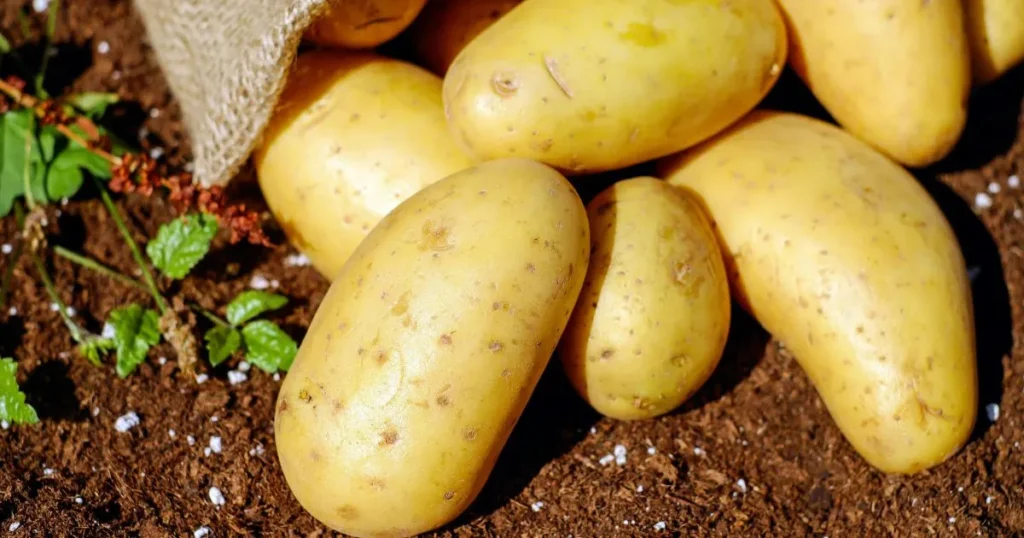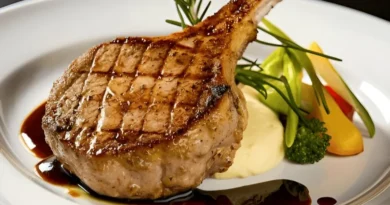Russet Potato Nutrition: Everything You Need to Know
Russet potatoes are more than just carbs. They contribute to a balanced diet by providing calories, vitamins, and minerals. Find out how they can be part of your meals and their health benefits that are often missed in American food.
Russet Potato Nutrition: Key Takeaways
- Russet potatoes are rich in essential nutrients, including vitamin C and potassium.
- They contain fiber to support digestive health and blood sugar regulation.
- The calorie content depends on the serving size and cooking method used.
- High in B vitamins, which support the conversion of food into energy.
- Key source of resistant starch for gut-friendly nutrition.
Understanding Russet Potato Nutrition Fundamentals
Russet potato nutrition is simple yet powerful for balanced eating. These spuds are unique, affecting taste and health. They’re a favorite in kitchens across the country.
What Makes Russet Potatoes Unique
Their thick, earthy skin and dense interior set them apart. Key traits include:
- High starch content for a fluffy texture when baked or mashed
- Neutral flavor that pairs well with seasonings and toppings
- Low moisture levels compared to waxy varieties
Russet Potatoes as a Dietary Staple
Russets have been a pantry staple for decades. Their nutritional balance makes them ideal for:
- Affordable protein-free energy via complex carbs
- Versatile cooking uses from baked to roasted
- Meeting daily fiber needs (3 grams per medium potato)
Recommended Serving Size and Portions
USDA guidelines suggest:
- A standard serving is one medium potato (7 oz raw)
- Adjusting portions based on activity level: active adults may need 1.5-2 servings
- Tracking skin-on versions for extra fiber benefits
Proper portioning ensures you get the nutritional benefits without excessive calorie intake, with a medium potato (7 oz) providing approximately 160 calories.
Russet Potato Calories and Macronutrient Breakdown
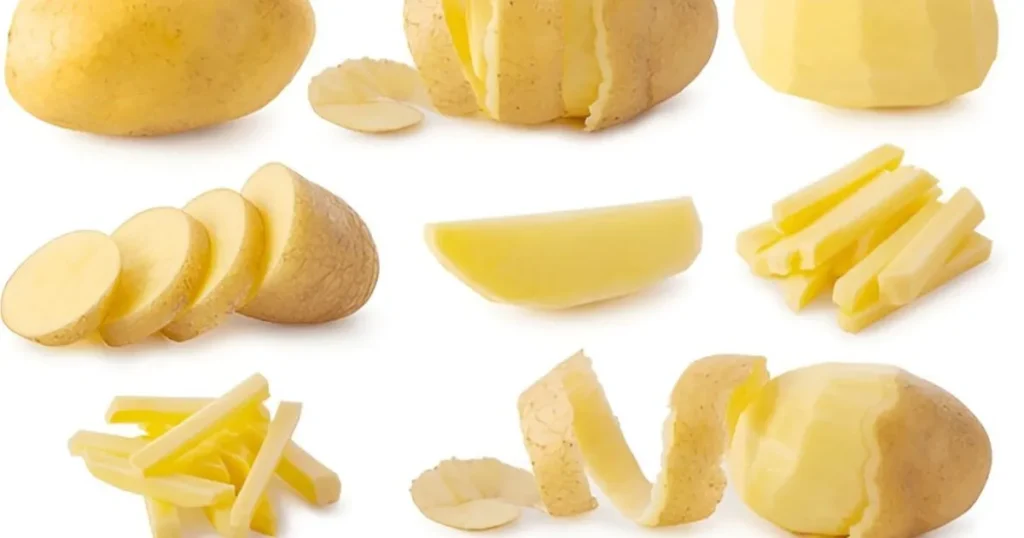
Knowing russet potato calories and nutrients is key for a balanced diet. Let’s explore how these potatoes contribute to your daily nutritional needs.
Calorie Content per Serving
A medium russet potato (6 ounces uncooked) contains approximately 168 calories. Baking keeps calories low, around 160. However, frying can nearly double the calorie content due to added oil.
Compare this to white rice (130 calories per 100g) or pasta (155 calories). This helps you make better choices.
- Baked russet potato: ~160 calories
- Fried: 148–350 calories (varies with oil used)
- Mashed: 120–200 calories (depends on butter/milk additions)
Protein Content in Russet Potatoes
Russet potatoes are high in carbohydrates and also provide 4.5g of protein per medium potato. This plant-based protein includes essential amino acids like lysine and glutamine. However, it’s lower in methionine.
For most, this protein works well with other plant proteins in meals.
Fat Content and Composition
Russet potatoes are naturally low in fat, containing less than 0.2g of fat per potato. Most of this fat is unsaturated. But frying adds trans fats from cooking oils.
Opt for roasted or boiled versions to keep fat intake low and support heart health.
Carbohydrate Profile of Russet Potatoes
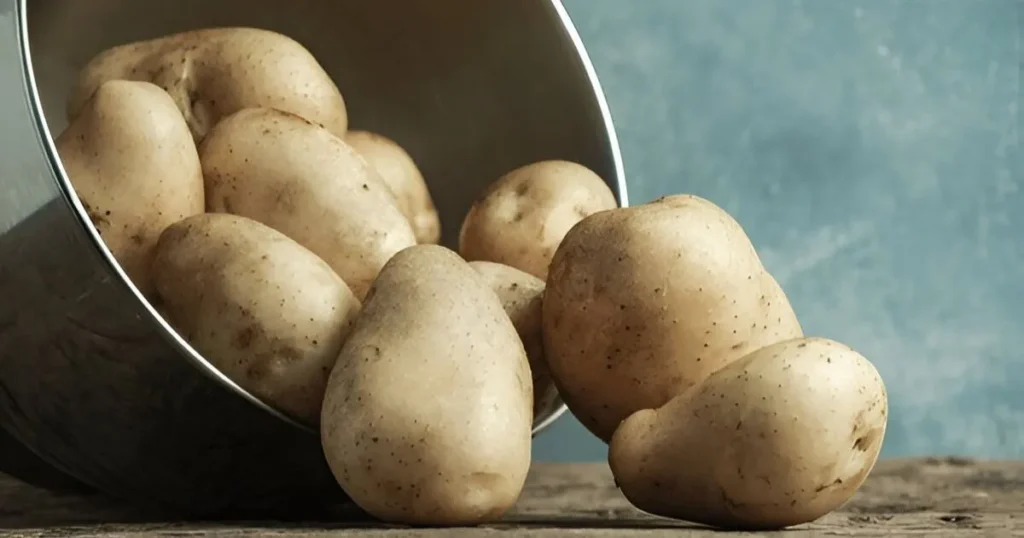
Russet potatoes provide a great source of energy through their carbohydrates. A medium potato contains about 37 grams of starch, 4 grams of fiber, and natural sugars. This mix affects how your body uses them.
Starch in russet potatoes splits into two forms: amylose and amylopectin. The carbohydrate ratio means that some carbs are digested slowly, while others are absorbed more quickly. This balance can influence your blood sugar levels after meals.
- Amylose (20%): breaks down gradually, helping you feel full for a longer period.
- Amylopectin (80%): Absorbs quickly, providing quick energy but raising blood sugar.
Fiber in the skin adds bulk. Out of the 4 grams of fiber, 1 gram is soluble (which supports digestion) and 3 grams are insoluble (which helps regulate bowel movements). Eat the skin to maximize fiber intake.
Cooling cooked russet potatoes creates resistant starch. This acts like fiber, feeding gut bacteria and boosting metabolism. Research shows this process turns 5–15% of starch into a prebiotic, aiding gut health.
“Resistant starch in cooled potatoes behaves like fiber, supporting gut microbiota.”
Russet potatoes have a high glycemic index (85) but moderate glycemic load (30 per medium potato). Pair them with fats or proteins to slow sugar absorption. For example, adding olive oil or beans can help balance your meals.
Contrary to myths, not all russet potato carbohydrates are unhealthy. Their fiber and resistant starch content offer benefits like improved digestion. Compared to grains or corn, a medium potato’s carbohydrates are similar to those in 1 cup of cooked rice, but with more fiber.
Essential Vitamins Found in Russet Potatoes
Russet potatoes are known for their texture and versatility. But, their russet potato vitamins are just as important. These spuds are full of vitamins that boost immunity, energy, and overall health. Let’s see how these vitamins help us stay healthy.
Vitamin C Content and Benefits
A medium russet potato has about 30% of your daily vitamin C (27mg). This vitamin is an antioxidant that boosts immunity and helps make collagen. To keep more of this vitamin, steam or microwave instead of boiling. Boiling can wash away some of these nutrients.
B Vitamins in Russet Potatoes
Key B vitamins in russet potatoes include B6, thiamin, niacin, and folate. They work together to:
- Vitamin B6: Helps turn food into energy and supports brain function.
- Thiamin: Important for nerve and heart health.
- Niacin: Helps fix DNA and keeps skin healthy.
- Folate: Crucial for cell growth and preventing birth defects.
These B vitamins team up with other nutrients in potatoes to power your body’s daily activities.
Other Important Vitamins
Minor but impactful vitamins include vitamin K (for blood clotting), vitamin E (for antioxidant protection), and carotenoids like beta-carotene. Your body turns beta-carotene into vitamin A for better eye and skin health. These nutrients show that potatoes are more than just a side dish.
Mineral Content and Their Role in Your Health
Russet potatoes are not just full of russet potato vitamins. They also have important minerals that help your body work every day. A medium russet potato gives you almost 10% of your daily potassium. This is more than bananas.
Potassium helps balance fluids, supports nerve signals, and keeps your heart rhythm steady.
- Potassium: 952mg per potato, aiding muscle and nerve function.
- Magnesium: 11% of your daily needs, key for energy production and bone health.
- Phosphorus: Strengthens bones and helps repair cells.
- Iron: Crucial for oxygen delivery via red blood cells.
Trace minerals like copper and zinc also play important roles. Copper boosts your immune system, and zinc helps wounds heal. These minerals are easier for your body to use when potatoes are cooked.
Soil quality and how potatoes are grown affect their mineral levels. Choose locally grown potatoes for the best nutrients.
Adding russet potato vitamins like vitamin C to potatoes makes iron absorption better. This shows how their nutrients work together. Whether you bake, boil, or roast them, russet potatoes add a mineral-rich base to your meals.
The Surprising Health Benefits of Russet Potatoes
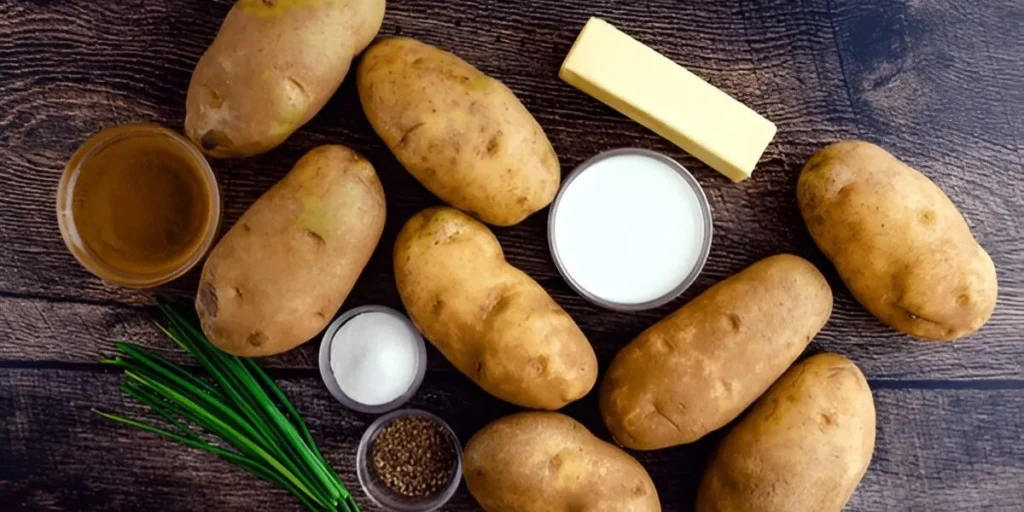
Russet potatoes are not just a simple side dish. They offer surprising health benefits when prepared right. Scientific studies show their nutrient profile supports overall wellness.
Blood Pressure Regulation
Russet potatoes have 610mg of potassium per medium potato. This is nearly 13% of your daily needs. Potassium helps balance sodium levels, easing blood vessel strain.
A 2020 study in the Journal of the American Heart Association linked higher potassium intake to reduced hypertension risk.
Their potassium-to-sodium ratio of 34:1 supports heart health.
Digestive Health and Fiber Benefits
With 2.7g of fiber per serving (with skin), they support gut health. Soluble fiber feeds good gut bacteria. Insoluble fiber helps with regularity. Key benefits include:
- Improved gut microbiome diversity
- Reduced constipation risk
- Enhanced nutrient absorption
Antioxidant Properties
Russet potatoes have three protective compounds. This table shows their roles:
| Antioxidant | Role |
| Flavonoids | Neutralize free radicals |
| Carotenoids | Support eye and immune health |
| Phenolic acids | Combat inflammation |
Weight Management Potential
The resistant starch in cooled russet potatoes acts like dietary fiber. It promotes fullness with only 110-160 calories per medium potato. Clinical trials show it may improve insulin sensitivity by 33% compared to refined carbs. Pairing them with lean proteins boosts their satiety effect, making them a smart choice for mindful eating.
By embracing these russet potato health benefits, you can enjoy a versatile ingredient. It supports heart, gut, and metabolic health without sacrificing flavor.
How to Prepare Russet Potatoes to Maximize Nutrition
Get the most out of russet potatoes with smart prep. These tips will keep your russet potato recipe full of vitamins and fiber. Simple cooking changes can boost health benefits without losing flavor.
Cooking Methods That Preserve Nutrients
Choose methods that keep vitamins and minerals safe:
- Steam: Cook diced potatoes in a covered pot to keep vitamin C.
- Bake: Roast whole potatoes at 400°F (200°C) for a crisp texture and B vitamins.
- Air-Fry: Use low-oil settings at 375°F (190°C) to avoid fat oxidation and keep antioxidants.
Common Mistakes That Destroy Nutritional Value
Avoid these habits to keep nutrients safe:
- Peeling skins removes 50% of their fiber and potassium.
- Boiling in excess water leaches minerals into the liquid—use a steamer basket instead.
- High-heat frying adds empty calories without enhancing flavor or nutrition.
Healthy Russet Potato Recipe Ideas
“Cooling cooked potatoes increases resistant starch, which feeds gut bacteria.”
Try these russet potato recipe variations:
- Spiced Roasted Wedges: Toss cut potatoes with paprika, garlic powder, and olive oil. Air-fry for 20 minutes.
- Stuffed Protein Bowls: Top baked halves with avocado, chickpeas, and salsa for a fiber-packed lunch.
- Cold Potato Salad: Mix cooled diced potatoes with Greek yogurt, dill, and lemon juice for a gut-friendly side.
Use these tips with earlier nutritional insights for balanced meals. This way, you honor russet potatoes’ natural goodness.
Russet Potatoes vs. Other Potato Varieties: Nutritional Comparison
When picking potatoes, russet potato nutrition shines with its high starch. This makes it perfect for baking or mashing. Compare it to red, yellow, and purple potatoes to find the best for your diet.
| Category | Russet | Red | Yellow/Gold | Purple |
| Starch Content | High (optimal for fluffy texture) | Medium | Medium | Low |
| Vitamin C | 15% DV per medium potato | 20% DV | 30% DV | Similar to russet |
| Fiber | 2g per serving | 2.5g | 2g | 3g |
| Antioxidants | Low | Moderate | High in carotenoids | High anthocyanins |
- Russet potatoes have 3x more starch than purple varieties, impacting glycemic index
- Yellow potatoes provide 50% more vitamin C per serving compared to russet potatoes
- Purple potatoes contain 3x the antioxidants due to their pigments
For russet potato nutrition, their high starch is great for soaking up flavors. But, they might not be good for low-carb diets. Red potatoes keep their shape when boiled, and purple ones add antioxidants. Use this guide to pick the right potatoes for your health goals, whether it’s fiber, vitamins, or flavor.
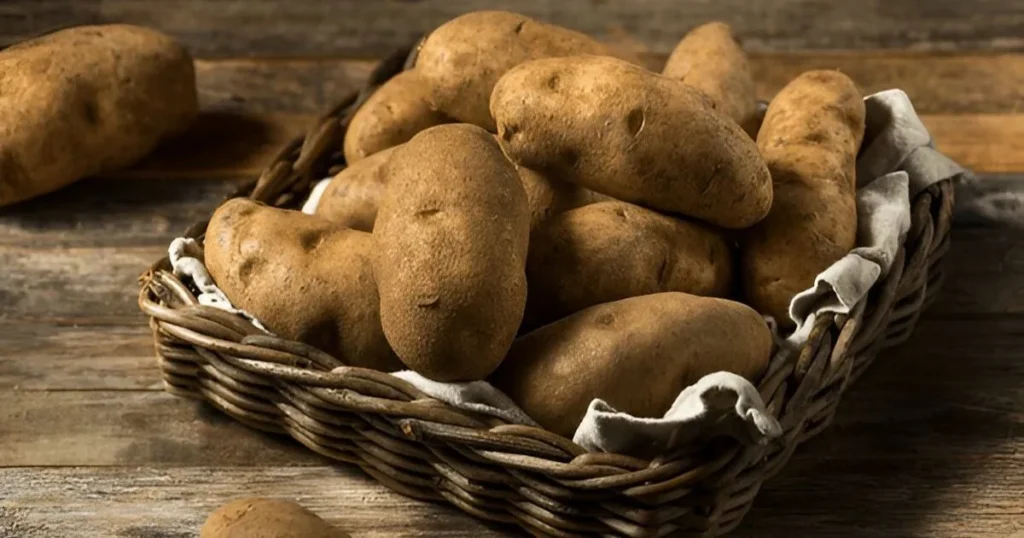
Conclusion: Incorporating Russet Potatoes Into Your Balanced Diet
Russet potatoes are great for your diet if you cook them right. They’re full of vitamin C, potassium, and fiber. These help with energy, heart health, and digestion.
Try baking or boiling russet potatoes to preserve their nutrients. Avoid frying to get the most health benefits.
Pair russet potatoes with lean proteins or veggies for a balanced meal. They’re good for athletes because of their carbs. People monitoring their blood sugar can enjoy russet potatoes in moderation.
Remember, portion control is key. Stick to ½ to ¾ cup of cooked potatoes to avoid consuming too much.
Don’t let concerns about potatoes scare you. Their health benefits are clear when cooked without extra fats or sugars. Their fiber helps control blood sugar.
When comparing them to other types of potatoes, consider what works best for you. Russet potatoes are an excellent choice when eaten in moderation.
Make russet potatoes part of a varied diet. They work well with fruits, proteins, and other veggies. By choosing smart cooking methods and portion sizes, you can enjoy their benefits without harming your diet. Russet potatoes are a nutritious option when prepared and consumed correctly.
FAQ
What is the nutritional profile of russet potatoes?
Russet potatoes are packed with nutrients. They are packed with carbs, fiber, vitamins, and minerals. A medium russet potato contains approximately 168 calories, 37 grams of carbs, and 4 grams of protein. They also have vitamin C, B vitamins, and potassium.
How many calories are in a medium russet potato?
A medium russet potato, about 6 ounces, has about 168 calories. The calories can change based on how you cook it and what you add.
What vitamins do russet potatoes provide?
Russet potatoes are full of vitamins, especially vitamin C. They give you about 30% of your daily vitamin C needs. They also have B vitamins like B6, thiamin, niacin, and folate. These vitamins help your body use energy and stay healthy.
Are there any health benefits to eating russet potatoes?
Yes, russet potatoes are good for you. They help your digestion with their fiber. They also help control blood pressure with their potassium. Plus, they have antioxidants that fight stress. They can make you feel full, which helps with weight management.
What is the carbohydrate content in russet potatoes?
A medium russet potato has about 37 grams of carbs. Most of these carbs are starch, which gives you quick energy. They also have fiber, which is good for your digestion.
What are some healthy ways to prepare russet potatoes?
To get the most nutrients from russet potatoes, bake, steam, or air-fry them. Avoid deep frying, as it adds unhealthy fats. Cooking with the skin on keeps more nutrients in.
How do russet potatoes compare to other potato varieties nutritionally?
Russet potatoes have more starch and less moisture than other types. This makes them fluffy when cooked. Red and yellow potatoes are waxy and have less starch. Russet potatoes are high in potassium and fiber.
Can russet potatoes be part of a weight management plan?
Yes! Russet potatoes can help with weight management. Their fiber makes you feel full. Adding them to meals keeps your diet satisfying and full of nutrients.
Are there any misconceptions about russet potatoes?
Some people think potatoes are unhealthy because of carbs. But russet potatoes are actually very nutritious. They can be part of a healthy diet when eaten in the right way and in moderation.
What minerals are found in russet potatoes?
Russet potatoes have important minerals like potassium, magnesium, phosphorus, and iron. A medium potato has about 952 mg of potassium. This is good for your heart and helps keep fluids balanced.

